

| search engine by freefind |
- Home Page
- Biographies
- Obituaries
- Marriages
- Queries
- Newspaper Clippings
- Photos
- Maps
- Local Contacts
- Online Resources
by Maxine K. Schuurmans
Joseph Zitka came to Dakota from Bohemia by way of Iowa in 1871, filed a claim west of the present town of Tabor, married Mary Bohac in 1876, and had a family of seven children. Soon he was holding offices in the court house at Bon Homme, sometimes walking there from his home. He was the first teacher in the Tabor district, and moved to Tyndall with the county seat where he became cashier of the Security Bank. He was a great banker, a skilled speaker, an efficient office worker, and he knew farming. Mr. Zitka was elected to a number of public offices and even found time to be treasurer of the Bon Homme Pioneer Association in 1902 and president in 1905.
Following his trade as a mason, "Nick" Zieser as he was familiarly known by his many friends, had a part in the construction of a large portion of the buildings and homes which make up Tyndall today. He died in April, 1936.
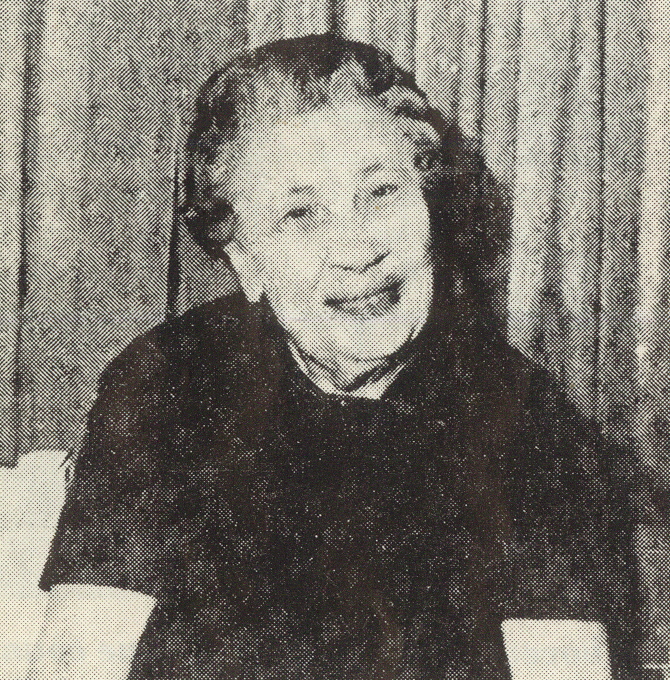
Emma (Weisser) Miller, daughter of pioneer Matt Weisser
Emma Weisser Miller was born in Tyndall December 25,1896 to Matt and Magdaline Weisser. She went to work in a general merchandise store as a clerk on Saturdays, and began working full time in the Chastka Bros. store when she graduated from high school. After she and her husband Albert Miller returned from Iowa where they lived for a time, she began working for Gelfand's store when the children were in school.
When she was about 15, her father asked her and a friend to come to his hardware store to demonstrate the Majestic ranges he was selling by making baking powder biscuits. Although she had never previously made them evidently they were okay, she laughs, because nobody died! Emma is a resident of the Good Samaritan home in Tyndall.
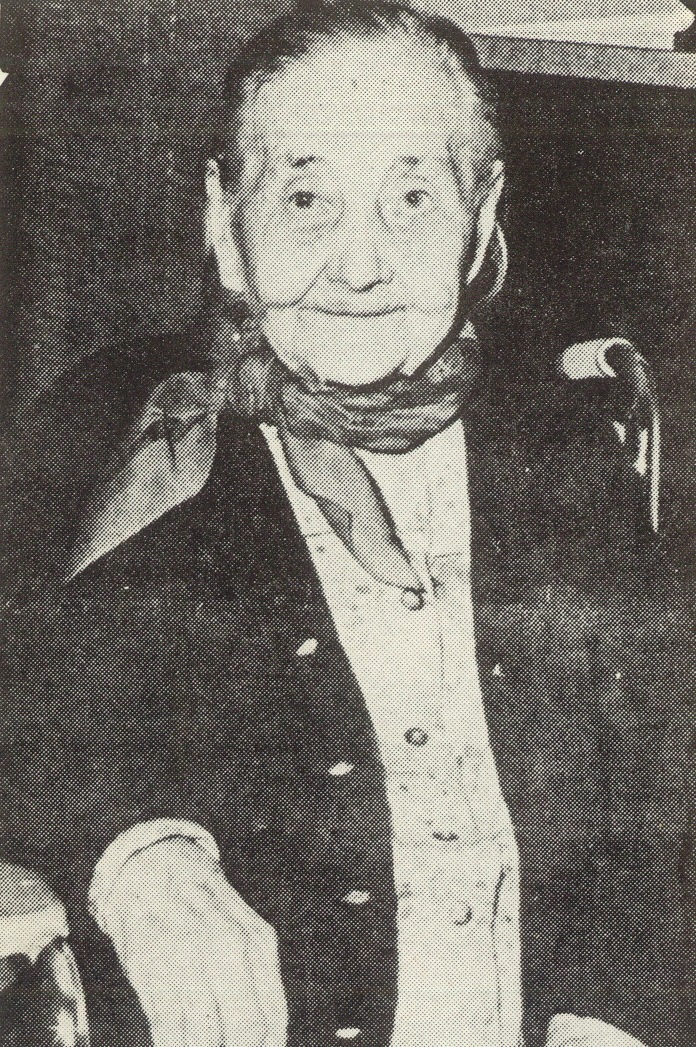
Mrs. Mary (Sykora) Koupal
Frank and Martin Sykora were two of several children of Franz Sykora who filed on land in Bon Homme County in 1871. They had a general merchandise and hardware store in Tyndall in 1885. One year later they built a brick store at the upper end of Pearl Street. Martin sold his share in 1923, moving to Charles Mix County where he filed a claim, and was associated with building in Wagner and Dante. Frank stayed on in business for some years, selling out to Joe Oliva.
Mrs. Mary Sykora Koupal was born just before midnight on December 31, 1880. Her parents moved to Tyndall from rural Scotland when she was three years old because her father wanted to join his brother John in operating a store. As the family circle became larger in the crowed rooms at the rear of the store, her father decided so many children should be on a farm so they returned to the country life which she loved. Mrs. Koupal was 13 at that time, and her only living sister, Mrs. Rose Souhrada, now 89, was three.
The Sioux Indians had camped near the farmland years before the Sykora moved to this location and for a long time family members could see bare rings on the ground surrounded by thistle which were left by teepees.
Farm life was more important than school to the early pioneers in the Territory, and Mary had to help her father in the fields, first harnessing the horses. During the evenings the children would help strip feathers for pillows and feather beds. Round loaves of rye bread as big as the oven itself were baked every other day. Pigs were butchered and the pork was fried and stored away in crocks, home-made bologna was stuffed and canned, and it was part of the usual summer chores to can apples, tomatoes and ketchup.
An important part of Mrs. Koupal's young life was learning the harmonica, which the children were all required to learn, and the family singing.
Mary Sykora married Joseph Koupal when she was 18, and the couple had 8 children. On Sunday or holidays when all the children descended upon the two-room Sykora home, she said there would often be 33 present, and if it happened to be Christmas, the grandparents would give each a sackful of candy, apples and cookies.
Mrs. Koupal resides in the Good Samaritan Home in Tyndall, where her Roman Catholic faith provides her with much comfort and solace. "I pray and pray and if I feel lonesome, I pray again," says this charming almost-centenarian, Tyndall's oldest resident.
Mr. C. H. Stilwill came to Tyndall with the court house from Bon Homme when he was Clerk of Courts. He was a member of the first city council, and was the first to construct a high board sidewalk on his property leading to the school. He was postmaster for a number of years, and contributed continually to the best interests of the community, as did his sons and daughter, Minor, Hiram, Hayes and Agnes. His daughter became Mrs. James Elliott. His son Hayes lived in Tyndall as manager of the Morgan Lumber Yard until he retired and moved to Sioux City.
Before Myrtle Burnett was married she, being very musically talented in piano, organ and voice, furnished appropriate music for the first motion pictures in Tyndall. She would improvise in the dark as the movie plot developed in the theater owned at that time by the Lower family. When she and W. L. Robinson were married, they made their home in the Tyndall Tribune building in an apartment behind the newspaper office. The east yard of the property facing the railroad tracks became a beautifully fenced and tree-shaded garden where pansies, roses and sweet peas were seasonal shows. The top floor of the building was leased to the Minier Hotel for an annex. Faintly on the east wall could be seen for many years the sign painted in 1903, "Robinson Bros. Real Estate." She died in 1950 in Washington, D.C. where she had made her home with her daughter Ruth, Mrs. Harold Chastka.
The building mentioned above was until recently the Beringer Cafe and now is Millie's Cafe.
Mr. William James Robinson was born November 14, 1854 in Delaware Co., Iowa. The educator and Methodist minister and his wife, Emma Glasner, moved to a farm near Kingsburg in 1891 with their four sons. In 1902 Mr. Robinson bought the Clarion in Avon, his sons W. L. and R. R. acquired the Tyndall Tribune from their uncle, F. P. Glasner, who at that time also published the Springfield Times. W. J. was elected county superintendent of schools in 1894 and 1896, became postmaster at Avon in 1903, continued in politics and teaching, and retired to Arkansas where he died in 1933.
Mr. V. J. Ptak bought his home in 1885, while it was located on the spot on which he later built his new business place. He moved the house over onto the next street, and it is now the Petrik Funeral Home. He built the new store in the year 1893. He and his son Emil had a clothing store in this building for many years. It was in 1950 the home of the DeLux Cleaners.
Rev. John P. Richmond was a missionary among the Indians, and was more familiarly known as "Old Doc," yanking teeth at $1.00 a pull in Bon Homme during the 70's where he also took care of the sick. He had two sons and a daughter. Oregon (so named because he was born on a man-of-war near the coast of Oregon) studied medicine in Louisiana, edited the Bon Homme Democrat with Andy Cogan, later a newspaper in Scotland, and was a scientist. While practicing in the county (he claimed to be the second doctor in the county), Oregon named our town Tyndall after John Tyndall, great British physicist and scientist of the 19th century. During the blizzard of 1888, it took Mr. Richmond half a day to go from his office to his home in the north part of town. He later practiced medicine in Chicago. Frances, a captain in the Civil War, was county superintendent and teacher, lived on his claim on the east side of town. The daughter, America, was the first teacher in the town of Tyndall, later became Mrs. J.P. Serr, living in Rapid City in 1954.
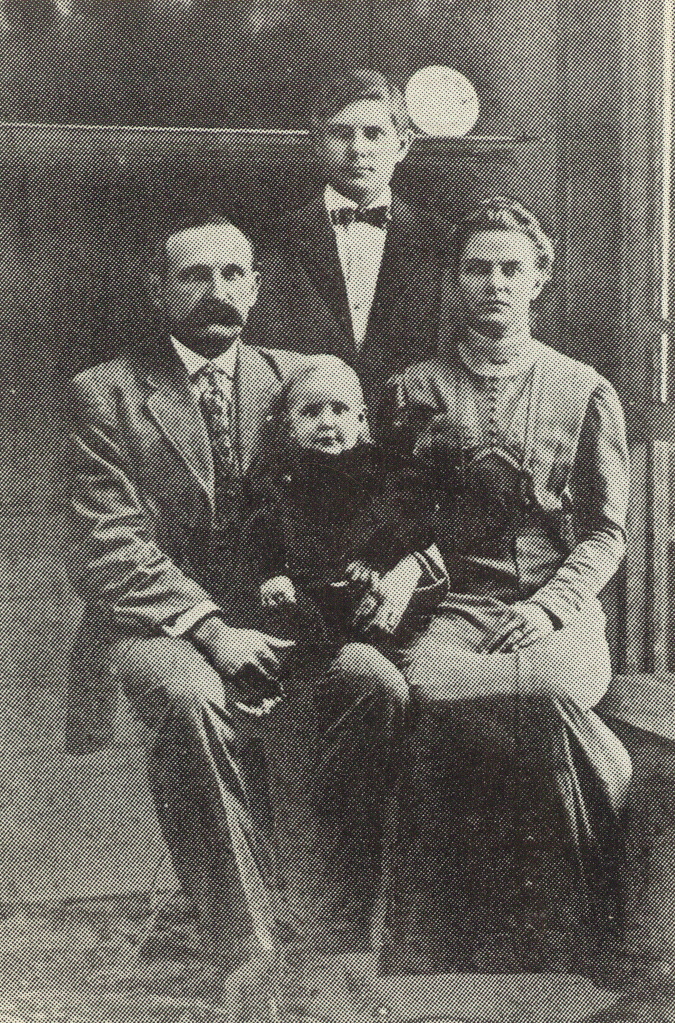
Mr. and Mrs. T. V. Ptak and Ladimer (standing) and Thomas K. ~ about 1912
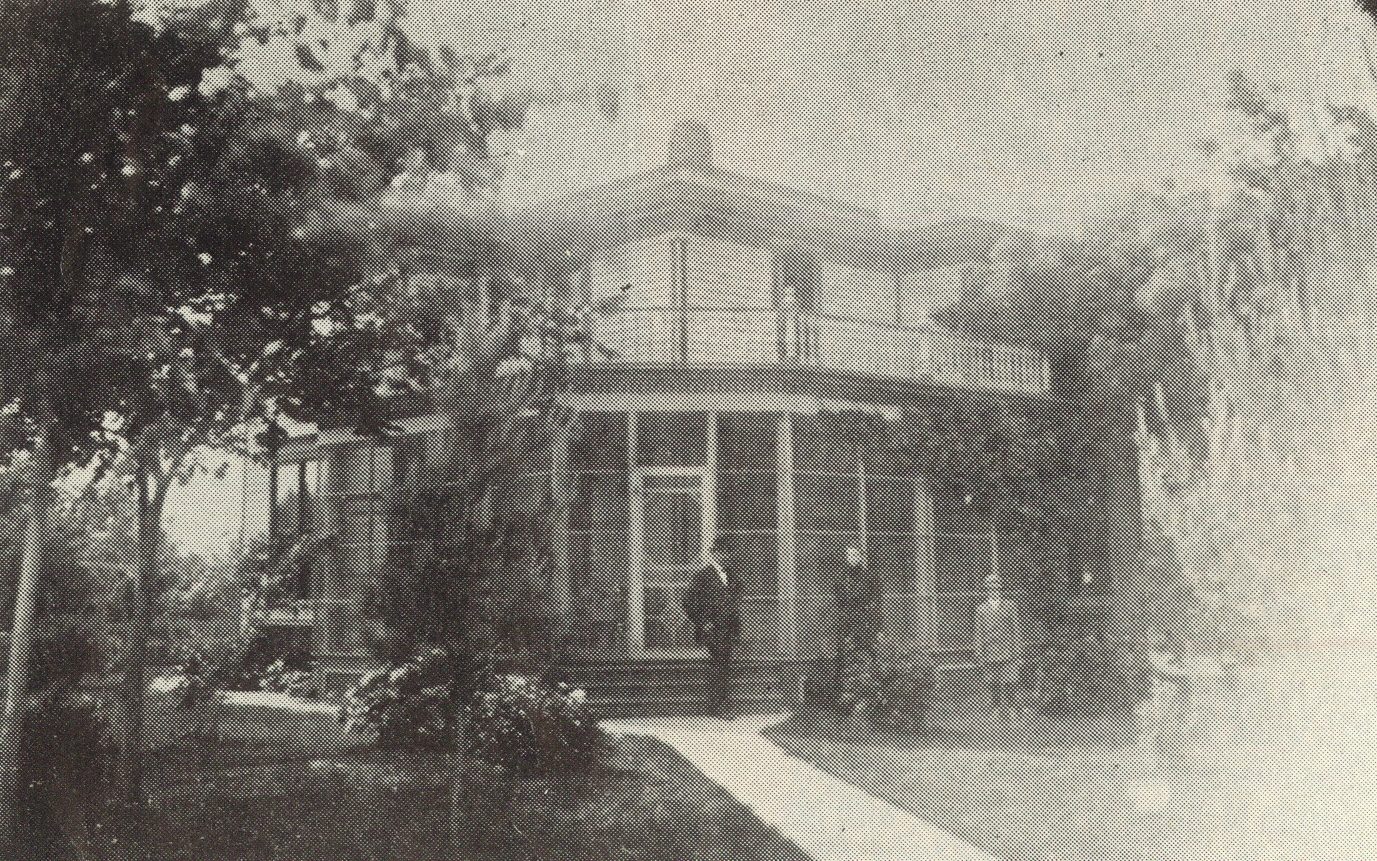
T. V. Ptak home in Tyndall, just north of the court house
The original lumber company was purchased by T. V. Ptak and his brother Frank from the Fon du Lac Lumber Co. of Madison, Wisc. on September 19,1890, on the present site, but the buildings constituted only a small office building, a lime and plaster shed, and only an open front shed to house the new supplies of lumber. The Ptak brothers continued partnership until about 1907. In the meantime they had established lumber yards in Tabor in 1901, and in Avon. Upon dissolution of their partnership in 1907, T. V. Ptak took over sole management of the Tyndall and Tabor yards and started a new branch at Neiburg, later known as Blaha, and Frank Ptak assumed the Avon company. In 1940 when T. V. Ptak celebrated his 50 years in the business, his sons Ladimer and Thomas K. took over the business. It became known as Ptak Bros. Lumber Co. In 1965 Ladimer retired and sold his interest to his brother and at the present time the company is known as the Thomas K. Ptak Lumber Co. His second son, Richard, is associated with him in the business.
This family lumber business has furnished lumber for many homes, farm buildings and commercial buildings in Bon Homme, Yankton, Hutchinson and Charles Mix counties. Many of these buildings remain standing yet and are being used in 1979. -Contributed by Thomas K. Ptak, 1979
About one mile west of the big Tabor curve where Highway 50 turns directly east toward Yankton and a little north on a country road lies a peaceful country cemetery bearing the name Ptakov Narodni Hrbitov. This family cemetery is bounded by wind-caressed pine trees which along with a slightly ailing link fence mark its ample boundaries. At one time when the Ptaks first came to Dakota Territory, they lived not far away and found solace in having so near such a peaceful place for their loved ones when they died. Others too are buried there, including one Frank Petrik, grandfather of the author.
When Tyndall was in its infancy the Phoenix family moved to this city and during the early years, Mr. Henry B. Phoenix taught school in what was known in the 30's as the Zolnowski school. He later bought out a furniture and undertaking business which he cared for until 1887 when he sold the business to Murray Colburn. He continued working for Mr. Colburn as long as he remained in the business. After this Mr. Phoenix followed his trade of painting and paperhanging at which he continued to work with his son Charles the rest of his life. Mr. Phoenix was truly a Christian man. When he came to Tyndall he united with the M. E. church of this city and was a consistent and faithful member since 1879. He was one of the first trustees of the church and did much to make it what it is today.
It was at the suggestion of Matt Oliva that his sister and her husband, the Anton Chastkas, came to Tyndall in 1879. Mr. Oliva and family lived on a farm northeast of the town site. He later moved to Tyndall and ran a general merchandise store in the spot later occupied by Post Produce as a warehouse. His son Joe built a new store on the corner, and the two buildings were known as Oliva's. The three daughters of Mr. Oliva who lived in Tyndall were Mrs. John Taplett, Mrs. Rothschadl and Mrs. Rose Proks.
Resident of Tyndall for many years before his death, A. S. Nedved would tell of the terrible three-day blizzard during his family's first winter in Dakota in 1869 when he was but eight years old. Mules were taken into the log cabin with the family to keep from perishing. Mr. Nedved's father, Frank, Daniel Cap, and Anton Pechan were the first three Bohemian families to settle in the territory between Yankton and Tyndall in what was known as the Lakeport area. First Bohemian Catholic services in the country were held in the Nedved cabin. At the time of the Tyndall jubilee celebration in 1954 Mr. and Mrs. Nedved were the longest married couple in South Dakota having been married 70 years. It was a common sight to see them driving around town in the immaculately kept-up Dodge touring car with the handsome windmill propeller ornament on the hood, of which the couple were so proud.
Mr. F. A. Morgan was an outstanding educator, statesman, and businessman. He came to Dakota Territory in 1879 from Wisconsin with ample experience in education and was made county treasurer. He also held other political positions in the city and county as well as being mayor in the 20's. Although he owned many acres of land, the lumber business he founded in 1879 was his first and last concern. It was the first retail lumber business in Bon Homme County and his name was associated with it for some years after his death in 1925 when the management shifted to his ____ law, H.K. Stilwill and his nephew Charles Morgan. This business is now Fullerton Lumber.)
He and his wife, the beautiful widow Mrs. Catherine Griffith McAuley of Springfield, with her two daughters and a third of their own played a large part in the social life of the town, often hosting social activities for the young people of the day. Mr. Morgan was rated an outstanding speaker and always delivered the speech on Memorial Day, few once having heard his "Logan's Orders" able to forget the golden tones and the effective delivery of that address and many others.
In 1877 Mr. and Mrs. Wm. Miller came to Bon Homme County with their family after having lived in Missouri, Minnesota and Wisconsin. During their first winter they lived in a sod shanty with its leaky roof, suffering all the hardships of the pioneers of those days, but the next spring Mr. Miller built a frame house on the edge of town in the southwest corner which in 1954 still stood. (-1954 Jubilee edition, Tribune and Register) Their homestead claim was the land behind the Chladek, Anolda Post, Al Wacker, etc., properties. When the railroad came, Mr. Miller sold a portion of his land to D.W. Currier who straightway cut it up into town lots. His daughter Mattie had the distinction of being the oldest pupil in the first school in Tyndall where she became a distinguished pupil. Later she taught, first in the country where she was caught during the great blizzard and had the good sense to keep her children with her in the schoolhouse during the long stormy night, and later in the town school. She became Mrs. Wm. McBurney and with her husband were leaders in the educational and cultural life of Tyndall until her death in 1912. Miller Addition and Miller Street, which are located to the south of the school were named for Wm. Miller.
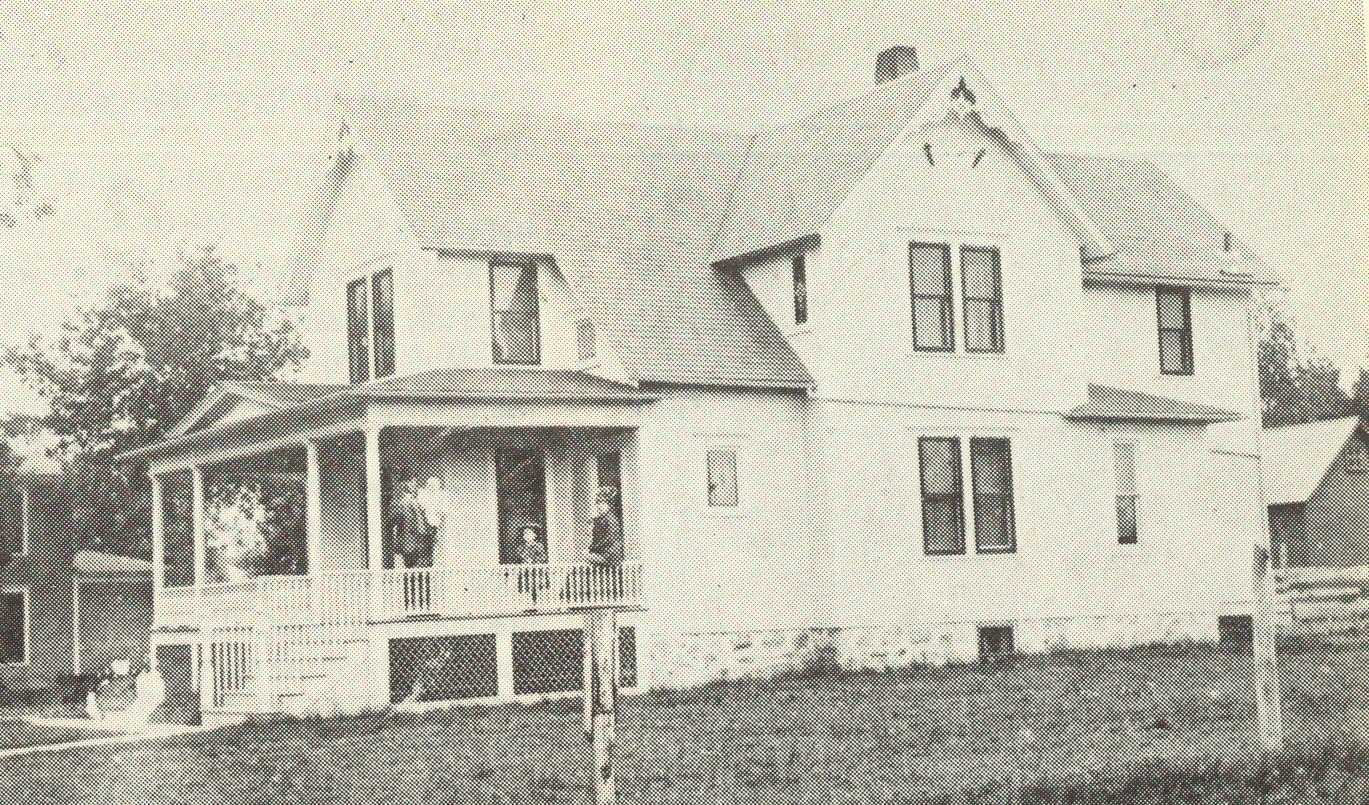
McBurney Home in Tyndall
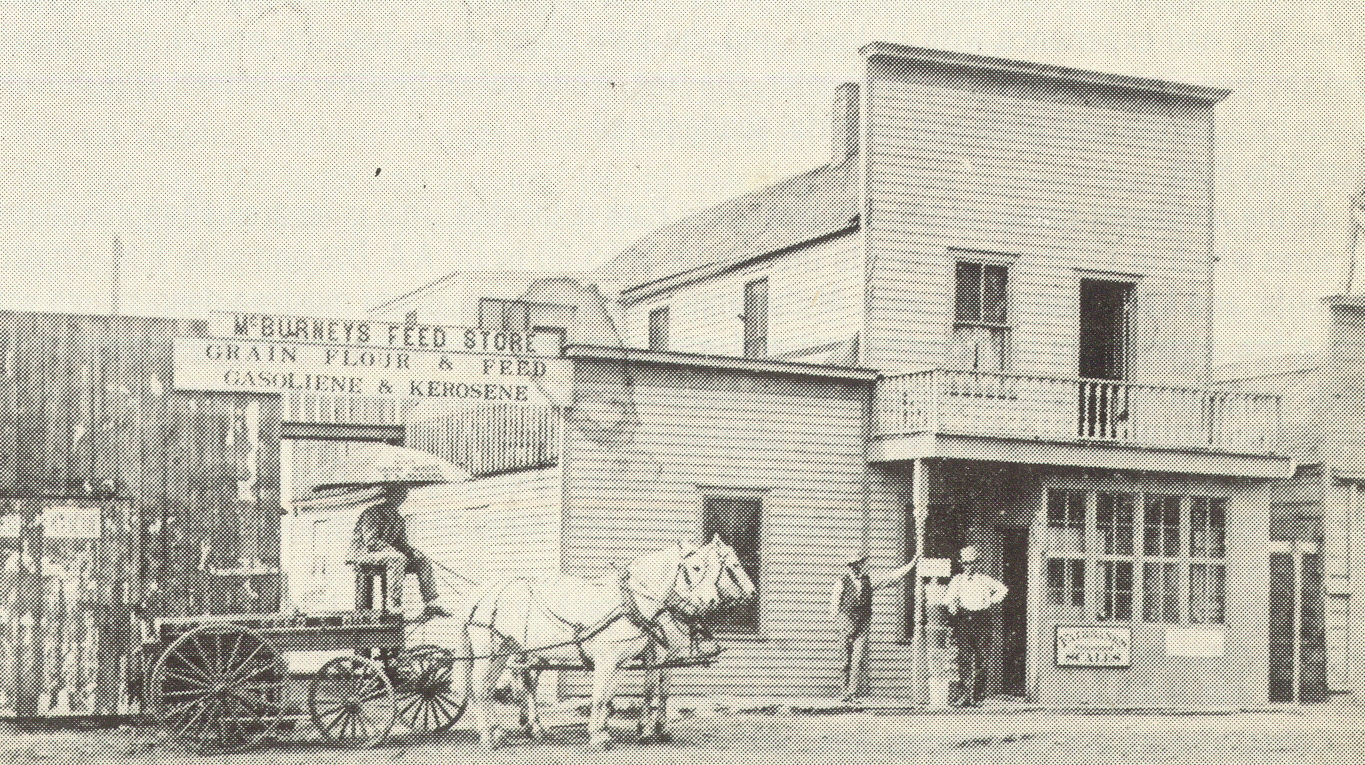
McBurney's Feed Store was purchased for $200.00 in 1897 by Mr. McBurney
When the Milwaukee railroad extended its lines through Bon Homme County it crossed through the present site of Tyndall. The village was platted in part on the homestead of William Miller. The youngest of the three Miller daughters married William McBurney, and they settled in Tyndall. They had met at Dakota Wesleyan University. Their two children, Laura and Howard, spent their childhood in Tyndall and were graduated from Tyndall High School.
The Consumer's Supply Company was established as a grain and feed store by William Miller in the very early days of Tyndall. William McBurney was taken into the business and continued with it as owner and manager throughout his adult life. His daughter, Laura, married a local boy, Leon Serr, and Leon was taken into the business. Leon survived Mr. McBurney and managed this "family" business for many years.
Howard McBurney (who contributed this information) has been away from Tyndall since his high school graduation. He says, "My early memories of Tyndall before automobiles, radio and television include muddy streets, four passenger trains a day (two on the "Platte line" and two on the "Running Water line"), Indian encampments on Emanuel Creek west of town, trapping and hunting and a rewarding high school education.
"I am now retired as Professor and Dean Emeritus from Northwestern University in Evanston-Chicago, Illinois. We now live in a beautiful little village in the mountains of western North Carolina. It may be relevant here to note that my professional career was given early direction and impetus by men of extraordinary ability and dedication with whom I had close associations in Tyndall well over a half century ago - Reverend Lloyd Rising, Oscar Phillips (Superintendent of the high school) and Principal Harold Card."
A note from Mrs. Lois Souhrada, Vermillion, who was familiar with the McBurney family, gives this added information. Mrs. McBurney, mother of Laura and Howard, died quite young and some years later Mr. McBurney married Adelle Merrill who came to Tyndall when she was hired to teach the second grade in the school system. The family contributed much to the education, business and religious facets of life in Tyndall during their lives.
The Serr family itself appeared upon the scene in the early seventies when a mother migrated from Russia with her large family of children after the death of her husband. The name of Serr was in the business life of the community for the next three generations, namely: August, Leon, and Maynard. (Maynard moved away when Consumers Supply Co. sold out to the Coop in 1954.
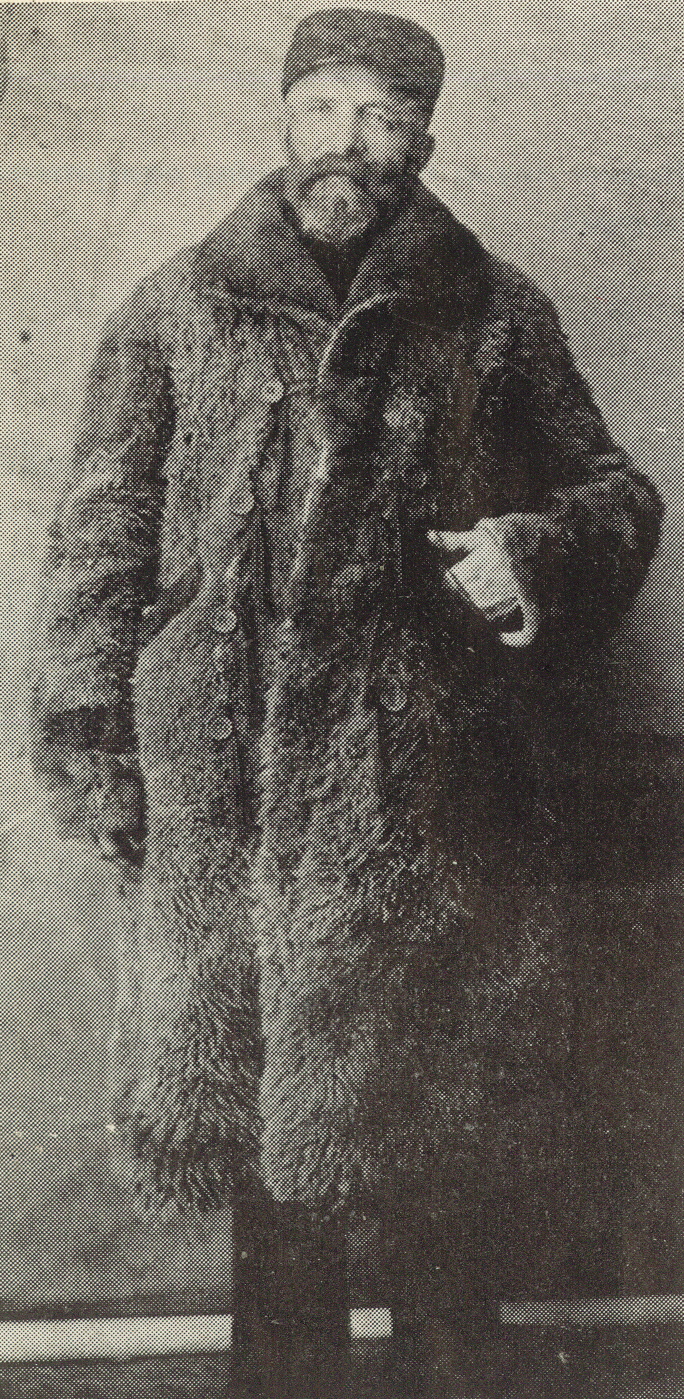
The life of August Koenig of Tyndall illustrates what may be accomplished in the land of freedom by one who comes as a stranger to our shores but is possessed of the attributes of thrift, industry and sterling honesty. He was born November 2, 1845 in the city of Mainz, on the Rhine, his parents being John and Susan (Hoffmann) Koenig, who were lifelong residents of Germany.
August Koenig passed his boyhood and youth in his native city and there he learned the stonecutter's and mason's trade. In 1864, not liking the idea of losing three years of his life serving in the army, he made his escape in a boat down the Rhine as far as Cologne and with six companions crossed the border into Belgium and embarked at Antwerp in a sailing vessel bound for New York. Having purchased a ticket through to Chicago, he proceeded at once to that city where he secured employment at his trade at good wages. In the spring of 1876 he made a prospecting trip as far west as Bon Homme County, Dakota Territory and in 1880 purchased 480 acres of land in Albion township, four miles southwest of Tyndall, to which he added from time to time until his ranch contained 1440 acres devoted to the raising of grain and stock. For many years he shipped cattle and hogs, often disposing of ten or twelve carloads during the season, the ready money at his command making it possible to purchase and ship even during the dry years.
Mr. Koenig was married in Ackley, Iowa, in 1870 to Miss Caroline Minow, and they had five children: Louis, Clara (Biersdorf), Elizabeth (Bussey), Johan and Emil. All became well established in life and an honor to their parents and a credit to the state in which they lived.
Mr. Koenig took a very active and influential part in public affairs and was thrice elected on the Democratic ticket to represent this district in the state legislature, although normally it gave a majority of from 300 to 400 to the opposing party. He served during the sessions from 1891-1895 and again during 1903. His official record is a credit to himself and the district which he represented, for he left office as he entered it-with the entire confidence of those he represented. He and his family were members of the German Lutheran Church and he was also identified with the Knights of Pythias, and at one time was on Odd Fellow.
When the family first came to Bon Homme County, Mr. Koenig built a log house in which the family resided until a few years later when it was replaced by a good frame residence. By the time they left the farm, he had one of the best improved places in the county. Stables had room to accommodate 24 head of horses, while 180 head of cattle found ample shelter in buildings provided for them. Sheds for machinery, cribs, and a granary completed the equipment of this model farm.
"To be rounding out a well spent life such as Mr. and Mrs. Koenig are doing, to have peace and plenty on the journey through, and to feel and know that one's neighbors hold them in the highest esteem is to have attained the best that may be enjoyed by pilgrims on life's journey," was the tribute paid to this pioneer couple in the History of Dakota Territory, Vol. IV, by George W. Kingsbury, 1915, from which this information is taken.
The Joe Kiehlbauch family were among those Germans who refused to live under the Russian yoke after being threatened with conscription after having been promised freedom. Like other Germans who had enjoyed that freedom in the southern Russian villages which they had built and in which they had lived after leaving Germany, they came to America in 1874 to escape the draft. The sons Joseph Jr., John and Henry settled in the Clear Lake area where they enjoyed the hunting and fishing. However, when Tyndall was established, Joseph Sr. went into partnership with Gustave Halb in the general merchandise store, and soon moved into town with his family. He soon went into business for himself in a frame building but in 1899 he built the "brown stone front" which still stands today, now occupied by Maureen's Dress shop. Although a fire broke out next door in 1901, the almost fire proof store saved the town from going up in flames. A quiet man of integrity, the man who had ruled over 17 villages in Russia described his store simply, "Mr. Joseph Kiehlbauch has a general store which suits our people."
The frame building first operated as a store by Joe Kiehlbauch may have been located on the property that is now the auditorium site, and his brother John was said to have had a hardware store next to it. They each built their homes across the street, John on the north corner of the block (now occupied by Mr. and Mrs. Bill Wittmeier) and Joe on the south end of the block (formerly the home of Mrs. August Houk and recently razed to become part of the beautifully landscaped lawn of Mr. and Mrs. Dick Mudder).
Born in Rencovin, Bohemia, Anton Hajek came to America when a young man. He married Anna Bouza of Tyndall in 1887, to which town they moved in 1895, and where they resided since. Being of an industrious nature, he was always busy. He was city drayman, engaged in farming and had a threshing machine whereby he helped many farmers in this vicinity to care for their grain. He was adept as a carpenter and house mover. During the early hours of his life in Tyndall he was reporter for the Dakoty Pokrok, published at Omaha, a Bohemian language paper enjoyed by many local subscribers who enjoyed his news of Tyndall and vicinity. During his 45 years residence in our city, Mr. Hajek made many friends, was of a friendly disposition and a man who could tell early day stories in an interesting manner. All enjoyed his conversations, as he was honest and upright in all his dealings. (Obituary, January, 1936)
William Glasner moved to Springfield in 1902, where he worked with his brother Frank in publishing a newspaper. He lost his eyesight there in an unfortunate accident. Later he conducted a newspaper in Tabor for two years, and then moved to Tyndall where for a year (1904) he published the Tyndall Tribune. He sold it and for 19 years he operated a restaurant business first where the First National Bank building now stands, and later the Corner Grocery across the street in which building the family lived (the Peschl's Market building). Although blind for many years, he was a man of keen mind and a fine conversationalist.
To the members of this community Judge J. D. Elliott is still plain "Jim", notwithstanding the honors that have fallen on his shoulders in later years. He took a keen interest in the early day development of this city. The fire department boys especially hold his memory green. He was an active member of the company while here, and upon the purchase of new equipment, the company received a substantial check from the judge with the request that it be used for "spending money". The boys held a social meeting on the proceeds. In the engine house, printed in large letters is the name "Elliott Hose Company No.1", the company having chosen this name in honor of Judge Elliott, or "Jim" as the older members still call him. - June 20, 1929
John Watson Curl, descendant of Quakers who lived in Pennsylvania in the middle 1700's, came to Dakota Territory in 1871 accompanied by his wife and son, Clarence, to homestead. They arrived by ox team in the fall, cutting wood near old Bon Homme to make a living the first winter. His mother and his wife's aunt and uncle also filed a claim a few miles southwest of Tyndall, but during the second year grasshoppers ate up the crops, so Mr. Curl went to work for the railroad and also threshed for the farmers around the county. Being musically inclined, he organized a fife and drum corp consisting of himself and several of his six sons, of whom Charlie and Bert played the snare drum.
About 1910 he purchased a merry-go-round which he took to various celebrations about the state, shipping by railroad until other transportation became more convenient. In 1925, Warren Curl, son of Clarence, went to Crill's Park north of Elk Point to buy a ferris wheel which he ran at many celebrations in South Dakota, Nebraska, Iowa, Kansas, and Minnesota for several years before selling it to his uncle, Art, who by now owned the merry-go-round, and had formed the Curl Amusement Co. Warren Curl lives on a farm seven miles south of Tyndall with his wife, the former Evelyn Taplett.
John Aloysius Cole, born April 1, 1875, was the oldest boy in his family which came to Dakota with the "Irish wagon train". The family homesteaded in 1869 north of Bon Homme. John taught school in 1892, attended Yankton College Academy the next year, and later attended what was to become Midland College in Freemont, Nebr. He then filed a homestead in Charles Mix County, continuing to teach in Bon Homme County during the required time to live on the claim. He married Mary Benesh in 1902, farmed on the parental farm until 1912 when he moved to the farm 3 miles southeast of Tyndall which he lived on until his retirement. In 1946 he was named Eminent Farmer of South Dakota. During World War II he and his wife proudly displayed a service flag with six stars as all first six sons served. The seventh, Basil, was "special" to his family, and remained with his parents the rest of their lives. He resides today at the Good Samaritan Home in Tyndall.
Sons Bart, Tom, Barney, and Tim, and daughter Bridget(Cogan) lived with their mother in an Irish colony in Clarksville, Missouri, during the years of the Civil War. Barney was the first to venture west, saw Bon Homme, and liked it and soon established the first blacksmith(sod) shop in the county in 1867. His sister Bridget soon joined him, establishing herself in the hotel business there. By 1869 many laughing, dancing, singing Irish soon made the little community a lively settlement. Barney loved entertainment and besides holding races of all kinds, called for and played dances in the hotel. Studying law all the while, he became in 1872 one of the first pioneer attorneys in Bon Homme County.
Among the families who made up the Irish wagon train from Missouri to Bon Homme were the Coles, Mulleagues, Dwyers, Glenns, McDonalds, Donnely, Williamson, Richmonds, Berrys.
Alois and F.F. Chladek came to Chicago from Sadska, Bohemia in the early seventies. Alois found time from his cabinet making there to scout Dakota Territory and file a claim near Tabor. After he married he farmed there and with his brother Frank, carried on an implement business in Tyndall in the early 80's. By 1888 the business was thriving with two car loads of machinery arriving at one time. That year "Lou" Chladek, Jr., was born, destined to play a large part as business and sportsman in the city. The son of Frank, F.F. Chladek, was the cashier in the Security Bank for many years.
Lou's wife Helen is still very much a fixture of Tyndall today, even though she herself is only a few years short of that centennial mark. She lives alone in her beautiful home filled with a life time's treasures at the far south end of West Pearl. Even before she married Lou, her life was adventurous, as Helen French had in 1911 "proved up" a claim in Stanley County, living by herself in that lonely county near Phillip where rattlesnakes were common and horseback was the only mode of travel. She remarked, "We had a lot of fun. For the first time in my life I went to dances where I could dance all night. You see, you didn't dare go home while it was dark because you couldn't find the way. Everything looks the same when you get out on the prairie, and so we danced until daylight."
The first Chastka to come to Dakota Territory spelled his name Castka as they did in Bohemia where he was born in 1853. Anton Chastka, Sr. first landed in New York where he worked as a tailor. Soon after he became a citizen in 1875 he married Mary A. Oliva, also born in Bohemia in 1856, and who worked in this country as a cigar factory worker as she had been trained in the old country.
In 1881 Mr. and Mrs. Chastka and their two children Anton (Tony) and Emal migrated to Tyndall where her brother, Matt Oliva, lived. Plans were made at once to open a saloon, and by March 1881 Anton had a contract with Ferdinand Cach of Scotland for a dwelling place 24x40' with a front room to be used as a bar. In May, Anton purchased from Alois Zienert Lot 3, Block 2, where the Chastkas lived for many years running the first saloon. This was on a lot just north of where the Catholic Church used to be.
Mary Oliva Chastka worked as a midwife in Tyndall. She was a bright, energetic and dependable woman and highly regarded by the early settlers.
Three other children were born to this union in the 80's, the girls Emma and Marie later moving to Oklahoma. Anton Sr. died in 1905, his wife in 1934, and son Emal in 1900, and all three are buried in the Czech National Cemetery.
Joseph (born in 1880 and his older brother Tony attended the Tyndall schools. Tony worked as a clerk in Schwerdtman's store and Joseph in Metzger's store. With this mercantile experience the young men began what was to be over fifty years in partnership as "Chastka Bros. General Merchandise Store". They began their enterprise with the purchase of the general merchandise store of Wm. Metzger in 1901, but soon built the large brick store which burned with a complete loss in the early morning of January 1,1919. A New Year's Eve party had been held by a lodge group on the second floor of the building. The fire alarm sounded first in the middle of the night. It was bitter cold, below-zero weather. The firemen were helpless as the water dropped in blocks of ice from the hoses.
Chastka Brothers met this disaster by making arrangements immediately to buy the business of Byers and Schuett in the store next to the First National Bank. Here they remained while the present store building (now the Coast to Coast store) was rebuilt on the site of the fire. Besides their store, the new brick block included the former Post Office, former Security State Bank, Hoch's Drug, Tyndall Bakery and the former Hermanek's Clothing Store. Chastka Brothers remained there until their retirement in 1952.
Joseph was a charter member of Elliott Hose Company No.1, and also a member of Modern Woodmen of America and the Knights of Columbus. His wife Anna (Hrachovec) and her family had come to Tyndall in 1893 to be near Anna's sister, Mrs. John Bouza. Anna was a trained seamstress and many lovely old dresses treasured by Tyndall families were made by her. Their sons Leonard and Harold grew up in Tyndall, and after college educations at Creighton University, pursued careers in government in Washington, D.C. for several years. Leonard and his wife later returned to Tyndall and purchased the hotel which came to be known as the Hotel Chastka. Leonard served as mayor until he moved to Oklahoma City where his only son, Joseph and family lived. Harold and his wife, Ruth Robinson Chastka, joined Leonard in the insurance business in Oklahoma City but later returned to live in Washington, D.C. with their son John and daughter, Ruth Anne.
Anton (Tony) took great interest in civic affairs and in the progress of the community. He served as president of the Commercial Club in 1912, as city councilman in 1913, as Mayor of Tyndall for a term beginning in 1918, again in 1932 for two terms, and again in 1938 until 1948, as well as other offices in the community. He married Albina Janda in 1918, and their two sons Anthony and Ralph grew up in Tyndall. They now live in the Washington, D.C. area with their families. Some years after Albina died, Tony married Emma M. Pletka, daughter of John J. and Maria Hrachovec Pletka. She had been a clerk in the store from 1917 to 1934 when they were married. Their daughter, Mary Jo Davenport, is now living in Yankton, the only descendant in the Tyndall vicinity.
After Tony's death in 1954, Emma managed the Hotel Chastka until her death in 1967, the elderly residents there finding her a kind and helpful friend and listener. She was active in several civic societies in Tyndall but the church was her special love. She was a charter member of Holy Rosary Court, National Catholic Society of Foresters and served as president for many years until her death. She also served the altar society, took part in a church study club, St. John Bosco's, and sang in the church choir. Emma's final contribution to Tyndall just a few weeks before her death was to write the story history of the city she loved for the Bon Homme County Pioneer Association for 1967, in which she included these words, "God Bless America and the Pioneers, all of them, of the Community of Infinite Opportunities, Tyndall."
Peter Byrne came to the U.S. in 1851 at age five and to Bon Homme County in 1870 where he filed on a pre-emption claim near Tyndall, and later a timber claim near Bon Homme. Together with William E. Bardwell, he operated a saw mill there for several years. Near the saw mill his son, Frank C. ("C" for centennial) was born in 1876 and two daughters followed. The family built a two-story home on land Mrs. Byrne had previously filed for a homestead claim and lived there for many years. Mr. Byrne was a politician, serving both county and state positions. For several years he was president of the Security State Bank in Tyndall. He was always a rugged individualist, always finding a way in bad times of which there were many to pull himself through financially in his extensive farming and livestock enterprises. In 1921 he moved from the family farm to Tyndall with his daughter Alberta where he lived until his death in 1931.
His son, Frank C., married Estella A. Petrik in 1898 after which they farmed in the Bon Homme-Tyndall vicinity until 1920 when they moved to Tyndall. After his sudden death in 1926, his wife continued to live in Tyndall until she died in her nineties. Their daughter, Helen, widow of Dr. Otto Isaak, still lives in Tyndall during the summer months, continuing in winter the practice of going south to MacAllen, Texas, which she enjoyed with her sun-loving, golf-loving dentist husband before his death in 1977.
Mrs. Estella Byrne had this to say about the year that her daughter Helen was born. Helen was born in an unplastered house on the Missouri River bottom where they fought mud, water and mosquitoes until fall when they moved house and all to what is now known as the Gordon McCann place. From there they moved to what is now the Wayland Dempster place, and in 1921 to town.
Mr. Theodore Biersdorf conducted a meat market in this community from 1884 until his retirement in June 1929. He was of the industrious, frugal and temperate type that built so solidly the foundation of civilization in this state. His reputation as an honest and plain-spoken character was widespread. Born in Suhl, Germany, December 23, 1859, he came to America in 1878. He was an expert maker of firearms, and worked in that trade for several years before coming to Tyndall in 1884. He opened a meat market in a building occupied by Robert Wick (1933), but later transferred to the substantial quarters later occupied by the Blachnik market.
Robert Biersdorf left his native Germany, going to South America where he made his home from 1893-1895, after which he decided to come to Tyndall and join his brother, Theodore, who was engaged in the butcher business. During his life he followed the butchering business, having learned the work in Germany. The two brothers also worked together as livestock dealers and their work along both lines was hard to exceed. On June 27, 1928, while working around the butcher shop, he received a severe injury, which later compelled him to retire from business. On June 5, 1929, the Biersdorf brothers sold their business but continued to buy and feed livestock. Robert never fully recovered from his fall.
Mr. Thomas H. Abbott who had been a school teacher and carpenter near the town of Bon Homme, moved to Tyndall when the town was in its infancy in 1881. He was a member of the board of trustees at the time the town was organized, and continued to be a member of that body until the town was incorporated. In 1882 he became interested in the lumber business in a yard occupying the location now occupied by the Ptak lumber yard. The large maple tree growing near the lumber office was planted by him about that time. Mr. Abbott occupied many positions of honor and trust during his long residence in Tyndall, being a member of the school board which built the first school house (1907-1909) and the school in 1928, and also oversaw the building of the new court house in 1914. He was county auditor and also county commissioner. As a carpenter he had part in building many buildings in Tyndall, including three dwelling places for himself during the 60 years. the Voigt dwelling in the west part of town, the home occupied by his son Henry, and the dwelling he occupied at the time of his death.
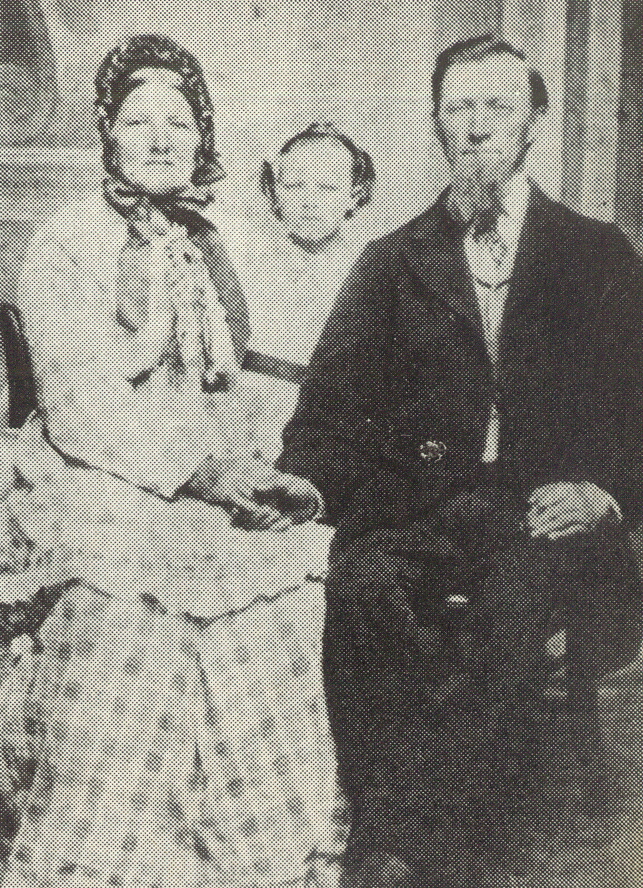
Julius Voigt, wife (Caroline), and a daughter
From A Composite History of the Descendants of Julius and Carolina Voigt by Mrs. Ray Voigt, come the following information: Julius and Caroline Voigt immigrated to America in 1872. They lived in Henry Co., Ill., for two years, then in 1874 came to Dakota. They were among the earlier pioneers in this area and set up what is believed to have been a small general store, and in one corner of the store was an area set aside for the post office. This all took place in what is now Tyndall before it was a city some 15 years before South Dakota became a state. (Contributed by Ted Schwarz).
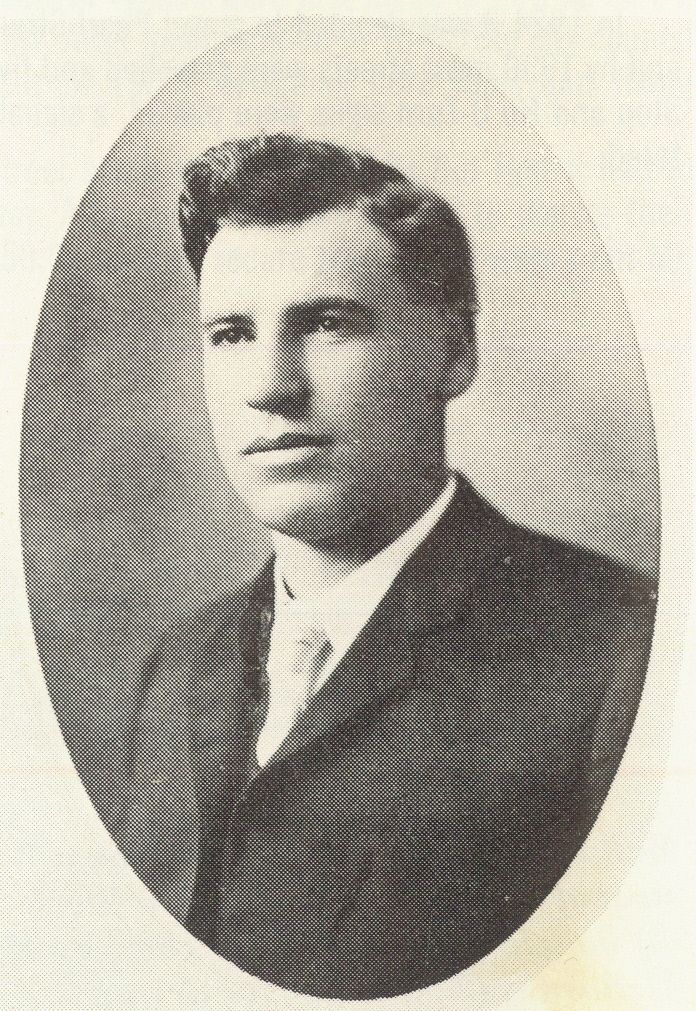
An interesting story in connection with the race track in the park is told about W. L. Robinson who was described this way in the Tyndall Tribune of December 17, 1908:
"Bill Robinson, farmer, philosopher, educator, journalist, grain dealer, and who if days enough are vouchsafed him, will have taken a turn at everything else in life's repertoire, traded horses four times Monday, studied the map Tuesday and Wednesday hopped to it as a full-fledged mail carrier on Route #4."
Mr. Robinson married Myrtle Burnett, daughter of photographer B. W. Burnett, in 1906, and their only daughter, Ruth, was born on September 29, 1908. He joined the First National Bank of Tyndall in 1911, working there the rest of his life. He especially enjoyed his work as clerk of many farm sales, priding himself on the speed and accuracy of his records. His athletic skills included sprinting and the following is an account of his part in the celebrated horse race in the Tyndall park in which Barney Cole had entered his trotter:
"... Being very hot, Will was holding a very large umbrella over Mr. Cole, continuing to hold it as the horse ran the race, pacing easily along with the horse ..."
This man who had been outstanding in scholarship, debating, and athletics in Tyndall High School, also played baseball for many years as catcher on the Tyndall team. He was a gay and witty man with a high sense of humor. For example, one day a great sewer pipe came rolling out of the lot where it stood, and apparently unaided, went merrily down Main Street. Will and a friend were walking inside it to furnish its momentum!